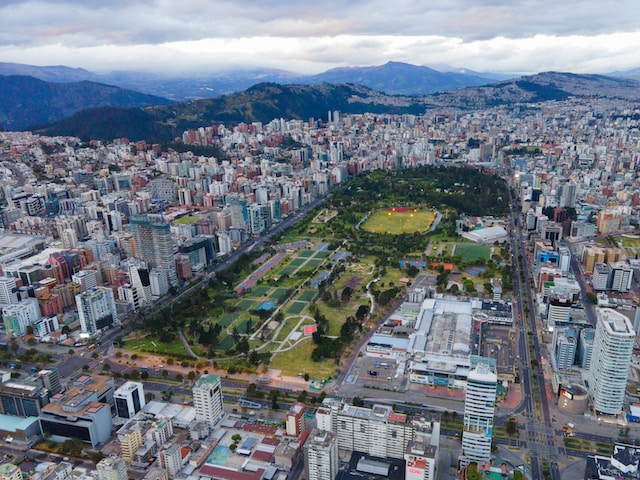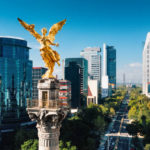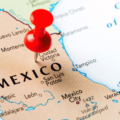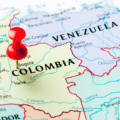The full guide to be a digital nomad in Quito Ecuador
*Equador has experienced a rise in crime since the end of 2022, keep up-to-date before you visit, read this article first*
Welcome to Quito, Ecuador – a vibrant and captivating city that has become increasingly popular among digital nomads looking for an affordable yet dynamic base in Latin America.
Nestled high in the Andean mountains, Quito offers a unique mix of rich history, diverse culture, stunning natural beauty and all the modern amenities needed for a seamless remote work experience.
In this comprehensive guide to Quito as a digital nomad destination, we’ll delve into everything you need to know about living in this fascinating city – from accommodation options to coworking spaces and local customs.
Key Takeaways
- Quito, Ecuador is a vibrant and historic city located high in the Andes that offers a unique mix of rich culture and stunning natural beauty, making it an ideal destination for digital nomads seeking an affordable yet dynamic base in Latin America.
- Digital nomads have various accommodation options available to them in Quito, such as co-living spaces, Airbnb rentals, and short-term apartment leases. They can also choose from several coworking spaces or public libraries/parks with reliable Wi-Fi connections.
- The local cuisine in Quito is a fusion of native and exotic ingredients, offering must-try dishes like Bolón de verde, Locro de papas or Fanesca. There are plenty of food options ranging from gourmet restaurants to traditional markets where digital nomads can explore the diverse culinary culture of this captivating city while remotely working at cafes/restaurants with Wi-Fi service available.
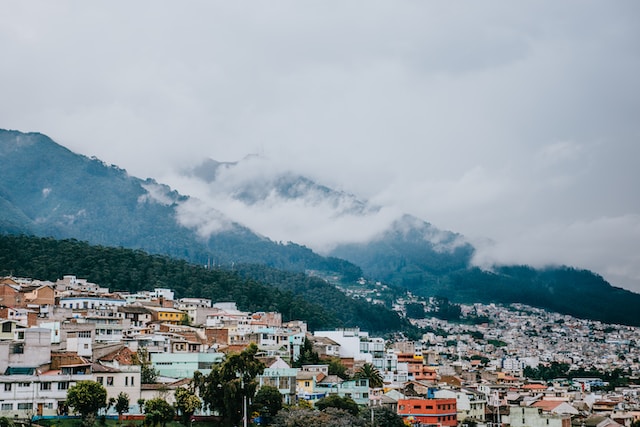
Quito, Ecuador
Getting To Know Quito: History, Culture, Geography, And Climate
Quito, the capital of Ecuador, is a city steeped in history and rich cultural heritage. Established by Spanish conquistadors in the 16th century, this UNESCO World Heritage Site boasts the largest and best-preserved historic center in the Americas – an area filled with exquisite colonial architecture, vibrant plazas and ornate churches.
Geographically speaking, Quito’s stunning location takes your breath away—both metaphorically and literally! Nestled high up in the majestic Andes at around 2,850 meters above sea level (9,350 ft), Quito offers breathtaking panoramic views of picturesque valleys surrounded by snow-capped volcanoes such as Pichincha.
The climate of Quito is often described as “the eternal spring” since daily temperatures hover pleasantly between 10°C (50°F) to 25°C (77°F). With its location right on the equator but elevated high up in mountains – hence named ‘La Ciudad de los Cielos’ or City of Heavens– visitors will experience mild weather throughout the year accompanied by subtropical highland conditions: warm days followed by cool nights.
Accommodation Options For Digital Nomads In Quito
As a digital nomad, finding the perfect accommodation is essential to your productivity and comfort. In this section of our guide to Quito, we explore various options available from co-living spaces to short-term apartment leases.
Co-living Spaces
Co-living spaces have emerged as a popular choice for digital nomads seeking accommodation in Quito. These unique living arrangements offer the best of both worlds, providing shared living and working areas that foster collaboration and networking opportunities.
Quito offers various co-living options catering to different needs – from spacious, luxurious villas boasting breathtaking views of the city’s skyline to budget-friendly apartments with cozy communal areas perfect for casual chats during downtime.
Some well-known co-living spaces in Quito include Selina Quito, Community Hostel, and Alinéa Co-Living & Co-Working.
Airbnb Rentals
Airbnb has become a popular accommodation choice for digital nomads and remote workers, offering a comfortable and flexible living space in Quito. With an abundance of options ranging from private rooms to entire apartments, Airbnb allows you to tailor your stay according to your preferences and budget.
Living in an Airbnb rental not only provides you with well-equipped spaces with Wi-Fi connectivity but also enables you to experience life among locals, immersing yourself in Ecuadorian neighbourhoods and exploring hidden gems within the city.
Additionally, hosts can provide invaluable insights into their favourite hangout spots or acquaint you with authentic Ecuadorian cuisine by recommending nearby restaurants and food markets.
Short-term Apartment Leases
Short-term apartment leases are a popular accommodation option for digital nomads in Quito, Ecuador. These leases usually range from one to three months, making them ideal for those who prefer a longer stay but don’t want to commit to a full-year lease.
There are various short-term rental options available throughout the city, including properties in central locations such as La Mariscal or La Floresta, which offer easy access to cafes, restaurants and coworking spaces.
Long-term rental costs for a two-bedroom apartment in Quito can range from $500 to $1,000 per month depending on the location and amenities offered.
Cost of living in Ecuador
| Item | Cost |
|---|---|
| Milk (1 liter) | $0.70 |
| Bread (1 loaf) | $0.50 |
| Eggs (1 dozen) | $1.00 |
| Rice (1 kilogram) | $0.50 |
| Beans (1 kilogram) | $0.50 |
| Chicken (1 kilogram) | $1.50 |
| Beef (1 kilogram) | $2.00 |
| Fruit (1 kilogram) | $0.50 |
| Vegetables (1 kilogram) | $0.50 |
Please note that these prices are approximate and may vary depending on the location and quality of the products.
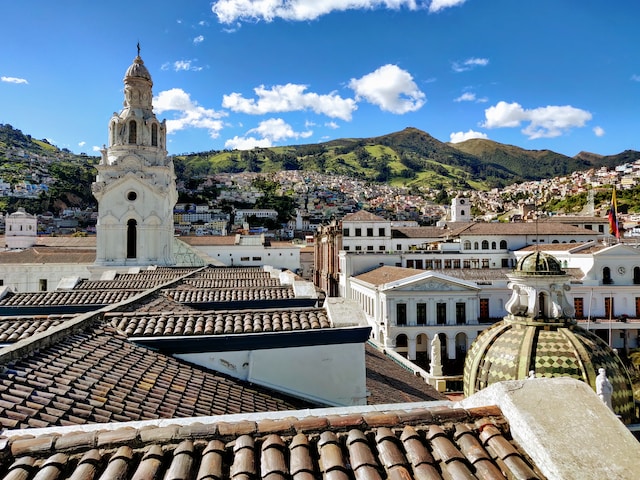
Quito, Ecuador
Best Places To Work Remotely In Quito – work in Ecuador
Discover the top coffee shops, coworking spaces, and public libraries where you can work remotely in Quito as a digital nomad.
Coffee Shops And Cafes
Quito offers a variety of coffee shops and cafes for digital nomads and remote workers to work from. Here are some popular options:
- Coffee Factory: A favourite among the locals, this coffee shop has reliable Wi-Fi and serves delicious breakfasts.
- Gitanos Brunch: This cafe is known for its cozy atmosphere, tasty brunch options, and fast Wi-Fi.
- Kofi Time: With its comfortable seating and free Wi-Fi, Kofi Time is a great spot to work from in the La Floresta neighbourhood.
- L’Artisan Panaderia: This French-style bakery serves up delicious pastries, sandwiches, and coffee, making it a great place to work from.
- KAFFE: Located in the heart of Quito’s tourist district, La Mariscal, KAFFE has plenty of space to work from and offers specialty drinks like matcha lattes.
- Sweet & Coffee: This chain coffee shop has several locations throughout Quito and offers plenty of seating options with fast Wi-Fi.
- Juan Valdez Cafe: A popular South American chain with reliable Wi-Fi and a relaxed atmosphere perfect for working remotely.
Keywords used: Digital Nomad Guide to Quito, Coffee shops and Cafes, Remote workers, Live in Quito
Coworking Spaces
Coworking spaces are a growing phenomenon for digital nomads in Quito. Here are some top-rated places to work remotely:
- Selina Coworking Quito – with locations in the trendy neighborhoods of La Mariscal and La Floresta, Selina offers both desk and private office rental options, as well as high-speed Wi-Fi, printing services, and access to community events.
- Impaqto – a social innovation space in the Carolina neighborhood that offers meeting rooms, event spaces, and networking opportunities. They also have a rooftop garden for when you need a break from your screen.
- Coworking ConQuito – located in the city center near Parque El Ejido, ConQuito is an affordable shared workspace that offers high-speed Wi-Fi, lockers, silent video call rooms, free drinking water and coffee, and free parking.
- Andino Coworking – situated in La Mariscal neighborhood this coworking space is equipped with all amenities like High-Speed WI-FI Internet Connectivity , Mini Library etc.
These are just some of the many coworking spaces available in Quito for digital nomads looking to network and collaborate with like-minded individuals while getting their work done efficiently.
Public Libraries And Parks
Public libraries and parks in Quito are great options for digital nomads looking to work remotely while enjoying natural surroundings and quiet spaces. Here are some of the best ones to check out:
- The National Library of Ecuador: located in the heart of Quito’s historic center, this library has an impressive collection of books and a peaceful setting.
- Parque La Carolina: one of Quito’s largest parks, La Carolina offers plenty of green space for picnics or outdoor work sessions.
- Plaza de Santo Domingo: this picturesque square in the historic center has free Wi-Fi and benches perfect for working on a laptop.
- Parque Metropolitano Guangüiltagua: situated just outside the city, this park offers stunning views of Quito’s skyline and numerous trails for hiking or biking.
- Parque Bicentenario: with its spacious lawns and serene lake, Bicentenario is another great option for remote work sessions surrounded by nature.
Digital nomads can make use of these public spaces to escape from their usual co-working areas or home offices, get some fresh air and sunshine, and enjoy all that Quito has to offer as a prime digital nomad destination.
The Food And Drink Scene In Quito
Discover the local cuisine and must-try dishes of Quito. With cafes, restaurants, and bars with Wi-Fi sprinkled throughout the city, you’ll never run out of options.
Local Cuisine And Must-Try Dishes
Ecuadorian cuisine is a fusion of native and exotic ingredients, and Quito is no exception. Digital nomads in Quito can try traditional dishes such as Bolón de verde, which consists of mashed plantain balls stuffed with cheese or pork; Locro de papas, a hearty potato soup with avocado and cheese; and yucca, a starchy root vegetable often served with meat or seafood.
Quito has plenty of food options ranging from Michelin-starred restaurants to local markets offering traditional dishes. The best way to experience the city’s food scene is by exploring its vibrant markets like Mercado Central and Plaza San Francisco, where you will find fresh fruits unique to the country like naranjilla, taxo fruit and babaco (also known as champagne fruit).
For those looking for more upscale dining experiences, chef Andrés Dávila’s Zazu restaurant is not be missed for its innovative take on Ecuadorian cuisine.
Cafes And Restaurants With Wi-Fi
As a digital nomad in Quito, you’ll have plenty of options for cafes and restaurants with Wi-Fi. Here are some great places to check out:
- Mariscal Café: Located in the trendy La Mariscal neighborhood, this café offers free Wi-Fi and a variety of coffee drinks.
- The Coffee Tree: With four locations throughout the city, The Coffee Tree is known for its specialty coffees and reliable Wi-Fi.
- Magic Bean: This coffee shop in the historic La Floresta neighborhood has a cozy atmosphere and strong Wi-Fi connection.
- Opera Bar Café: If you’re looking for a place to work with an upscale vibe, Opera Bar Café is the spot for you. Enjoy gourmet coffee drinks while getting your work done on their fast Wi-Fi.
- Nomada Coffee: Another great option in La Floresta, Nomada Coffee has a spacious interior and outdoor patio area with plenty of seating and reliable Wi-Fi.
- Vista Hermosa Café: If you’re seeking a panoramic view of Quito while working, Vista Hermosa Café is worth checking out. This rooftop café offers stunning views of the city along with free Wi-Fi.
- El Espectador Mercado Gourmet: This food hall located near the city center not only has delicious food options but also fast and free Wi-Fi to get your work done while enjoying local cuisine.
Make sure to bring your laptop charger as many cafes do not provide outlets. Also be mindful that some cafes may have limited seating or busy hours during peak times like lunch or after work hours.
Bars And Nightlife Options
Quito is known for its lively nightlife, restaurants, and bars, making it a popular destination for digital nomads. Here are the top bars and nightlife options to check out:
- Mariscal Sucre: This area of Quito has the most drinking and dancing venues, frequented by Western backpackers and young Ecuadoreans.
- Bandidos Del Paramo: A popular spot in Quito for expats, teachers, and travelers to enjoy American-style pub food.
- Plaza Foch: A notable area in Quito that offers a variety of bars, pubs, discos, and nightclubs for a fun night out.
- Dirty Sanchez: This bar is known for its cocktails and craft beers with quirky names like “My Doctor Says I Need Glasses.”
- La Ronda: An historic street in Quito that is home to many traditional Ecuadorian taverns where you can try local drinks like canelazo or chicha.
- Café Mosaico: This café/bar is perched on the hillside overlooking the city and offers stunning views along with delicious cocktails.
- Jazz Society Café: A cozy spot that hosts live jazz performances and serves up tasty snacks along with their drinks.
- Techo Propio Brewing Co.: A microbrewery that produces their own craft beers right in Quito’s Old Town – perfect for beer lovers!
With so many options to choose from, you’ll never run out of places to explore during your time in Quito as a digital nomad!
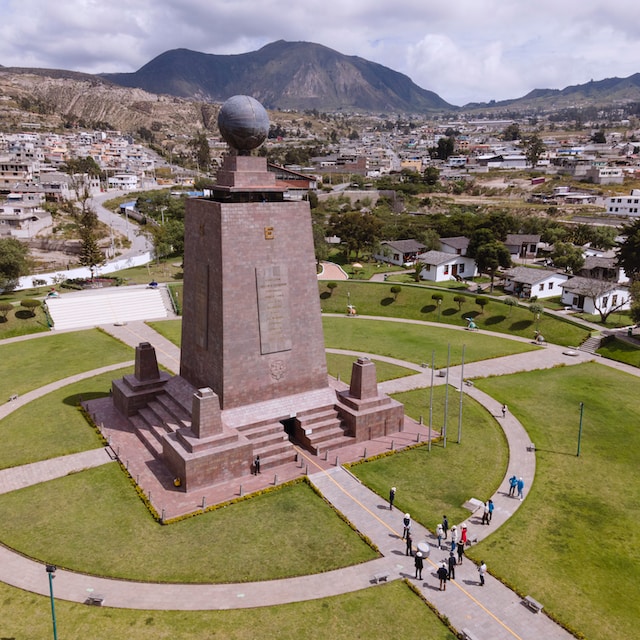
Cd Mitad del Mundo, Quito, Ecuador
Exploring The City As A Digital Nomad
Discover Quito’s rich history and culture while working remotely! Enjoy outdoor activities, explore tourist attractions, and experience the local cuisine.
Tourist Attractions And Landmarks
Quito is a historic and culturally rich city, with plenty of landmarks and tourist attractions to explore. Here are some must-see places for digital nomads visiting Quito:
- The Old Town: Quito’s Old Town is a UNESCO World Heritage Site, full of colonial architecture, picturesque plazas and narrow streets. A great place to wander around and soak up the atmosphere.
- Mitad del Mundo: Located just outside Quito, this monument marks the Equator line – the spot where the northern and southern hemispheres meet.
- Teleferico: Take a cable car ride up into the mountains for stunning views over Quito and beyond.
- La Compania de Jesus Church: Arguably one of the most beautiful churches in South America, this baroque masterpiece is worth a visit for its intricate gold leaf decorations.
- Parque Metropolitano: This sprawling park on the outskirts of Quito offers hiking trails, picnic areas and panoramic views of the city.
- El Panecillo: This hill overlooking Quito is home to a giant statue of the Virgin Mary and offers 360-degree views of the city below.
- Plaza Foch: Located in the trendy Mariscal neighbourhood, this square is a hub of restaurants, bars and nightlife – perfect for socialising after a day’s work.
- Museo del Banco Central: This museum showcases Ecuador’s rich cultural heritage through art, artefacts and exhibits on indigenous cultures.
As digital nomads settle in their new home away from home in Quito they can explore these landmarks while working remotely which gives them ample opportunity to experience Ecuador’s unique culture firsthand while retaining their routine as remote workers or digital nomads.
Outdoor Activities And Sports
Quito is a great destination for digital nomads who enjoy outdoor activities and sports. Here are some options to choose from:
- Hiking: Explore the Andes Mountains by taking a hike on one of the many trails around Quito. You can trek to the top of Cotopaxi, an active volcano, or explore Pichincha, just west of downtown Quito.
- Skiing: If you’re visiting Quito during the winter months (June to September), head up to the nearby ski resort at Cayambe Coca National Park. Enjoy skiing or snowboarding while taking in stunning views of Antisana and Cotopaxi volcanoes.
- Mountain Biking: For those who enjoy adrenaline rushes, mountain biking is a popular activity in Quito. Ride down steep hills and take in breathtaking views of the mountains and valleys.
- Paragliding: Take flight over Quito’s rugged terrain with a paragliding adventure. Experience stunning views while soaring above the city and its surroundings.
- Rock Climbing: Test your climbing skills on the granite rocks around Pichincha volcano that offer varying degrees of difficulty for climbers.
- White Water Rafting: The rivers near Quito provide opportunities for white water rafting, offering a perfect way to cool off during hot summer days.
- Horseback Riding: Gallop through rural communities near Quito on horseback and experience traditional Ecuadorian life firsthand.
With so many exciting outdoor activities available within easy reach, it’s no wonder that Quito is considered one of South America’s best destinations for adventure-loving digital nomads!
Cultural Events And Festivals
Living in Quito as a digital nomad offers the opportunity to experience a variety of cultural events and festivals. Here are some of the top ones to check out:
- Fiestas de Quito – A week-long celebration featuring parades, concerts, and fireworks in honor of the city’s founding.
- Semana Santa – Easter Week is celebrated with processions and religious ceremonies throughout the city.
- Festival Internacional de Artes Vivas – An annual performing arts festival showcasing theatre, dance, music, and circus performances from around the world.
- Día de los Muertos – The Day of the Dead is celebrated with colourful displays of altars, flowers, and traditional food.
- Inti Raymi – A celebration of the winter solstice featuring traditional Andean music, dance, and rituals.
- La Mama Negra – A colourful parade in nearby Latacunga that combines Catholicism with indigenous beliefs to celebrate fertility and good harvests.
- Independence Day – Ecuador’s national day is celebrated on August 10th with parades, patriotic speeches, and live music.
- Quitonía – A month-long celebration of Quito’s culture and history that includes art exhibits, concerts, theatre performances, and more.
With its rich cultural heritage and diverse population, there is always something happening in Quito for expats or digital nomads looking to experience new things.
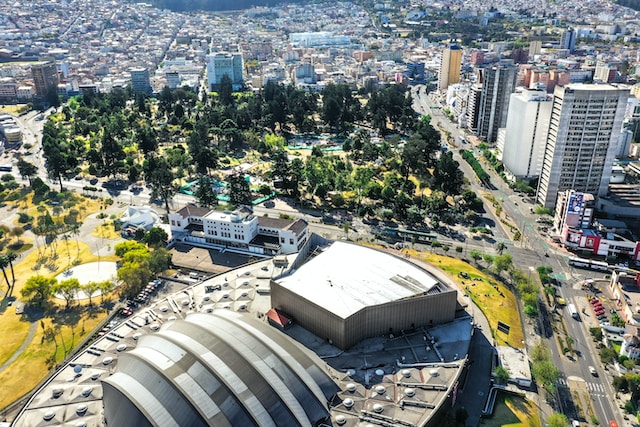
Quito, Ecuador
Safety Tips For Digital Nomads In Quito
Stay aware of your surroundings at all times, avoid flashing expensive items and keep valuables close to you.
Avoiding Pickpockets And Scams
Quito is a generally safe city, but pickpocketing and petty theft still occur. Digital nomads and remote workers need to be aware of their surroundings and take necessary precautions to avoid becoming a victim. Here are some tips for avoiding pickpockets and scams while in Quito:
- Keep your valuables out of sight: Do not flash your phone, camera, or other valuable items in public areas. Keep them hidden in a bag or pocket.
- Avoid carrying large amounts of cash: Use ATMs to withdraw small amounts of money as needed instead of carrying around large sums.
- Be cautious on public transportation: Pickpockets often target crowded buses and metro stations. Keep your belongings close at all times.
- Watch out for distraction techniques: Scammers may approach you asking for directions or trying to sell something while someone else steals your belongings. Stay alert and be wary of anyone who seems overly friendly or persistent.
- Use reputable taxis or ride-sharing services: Taxi scams are common in Quito, so make sure to use licensed taxis or ride-sharing apps like Uber.
By following these safety tips, digital nomads and remote workers can enjoy their time in Quito without worrying about being targeted by pickpockets or scammers.
Staying Aware Of Your Surroundings
As a digital nomad living and working in Quito, it is essential to be cautious and aware of your surroundings. While the city has its share of safety concerns, staying alert can help you avoid trouble.
Additionally, it’s crucial to stay informed about local news and events that could affect your safety. This includes protests or demonstrations that may occur throughout the city.
Transport Safety And Precautions
Transportation in Quito can be a bit tricky, but by following these simple precautions, digital nomads and remote workers can get around the city safely:
- Use trusted taxi companies or ride – sharing services like Uber to avoid unsafe taxis.
- Avoid taking public transportation at night, especially buses.
- If you must take a bus, be aware of pickpocketing and keep your belongings close.
- Be cautious when using the cable car to climb up to the top of Pichincha Volcano. Only take it during daylight hours and avoid crowded times.
- When walking or cycling around the city, stay alert for reckless driving and always use designated pedestrian crossings.
- Finally, always trust your instincts and be aware of your surroundings. If something feels off, it’s better to avoid it.
Budgeting For A Digital Nomad In Quito
To make the most of your time as a digital nomad in Quito, it’s crucial to budget effectively- from cost of living and accommodation to food and activities.
Cost Of Living And Accommodation
Living as a digital nomad in Quito is an affordable experience, especially when compared to other South American cities and Western destinations. The monthly cost of living for a digital nomad in Quito is around $1,000 USD, depending on accommodation choice and lifestyle preferences.
Accommodation options range from hostels starting at $10 per night to private apartments costing between $300-$600 USD a month.
It’s worth noting that while Quito may be cheap by Western standards, prices can vary greatly within the city itself. For example, living in La Mariscal – known for its nightlife scene – will generally come with higher rental costs than staying in La Floresta or outside the city centre.
Knowing your budget beforehand can help you make informed decisions about where to stay during your time in Quito.
Ecuador has positioned itself as one of Latin America’s most attractive destinations for retirees, freelancers and remote workers alike due to the low cost of living while enjoying high-quality services available across the country including healthcare systems infrastructure— making it an obvious choice to live comfortably without breaking the bank.
Budget-friendly Food And Activities
If you’re a digital nomad looking for budget-friendly food and activities in Quito, then you’re in luck. Here are some options to consider:
- Try the local street food: Ecuador is known for its delicious street food, including empanadas, ceviche, and llapingachos (potato patties stuffed with cheese). These dishes are cheap but tasty and perfect for digital nomads on a budget.
- Check out the local markets: There are several markets in Quito where you can find fresh fruits, vegetables, and meats at affordable prices. Head to Mercado Central or Mercado San Francisco to get a taste of authentic Ecuadorian cuisine.
- Explore the city’s parks: Quito has many parks that are free to enter and offer stunning views of the city’s mountains and landscapes. Parque La Carolina and Parque Bicentenario are popular choices among digital nomads.
- Take advantage of free walking tours: Many tour operators offer free walking tours of Quito’s historic center, which is a UNESCO World Heritage site. This is a great way to explore the city without spending any money.
- Hike up Pichincha Volcano: For adventure-seeking digital nomads, hiking up Pichincha Volcano offers incredible views of Quito without breaking the bank. There are several hiking trails available for all skill levels.
These are just a few examples of budget-friendly food and activities that digital nomads can enjoy in Quito. With its modest cost of living and endless opportunities for exploration, it’s no wonder why it’s become such a popular destination for remote workers from around the world.
Currency Exchange And Banking
It’s important to understand the currency exchange and banking system as a digital nomad in Quito. The official currency is the US dollar, so exchanging money won’t be necessary if you’re coming from the US.
Several major banks operate in Ecuador, including Banco del Pacífico and Banco Pichincha. ATMs are widely available throughout the city but use only those located inside or outside reputable banks or shopping centers.
Local Culture And Customs To Be Aware Of
When living in Quito as a digital nomad, it’s important to be aware of the local customs and culture such as greeting etiquette, bargaining practices, and dress codes.
Greetings And Communication Styles
In Ecuador, the way you greet someone is important and can set the tone for your interaction. It’s customary to greet people with a handshake or a kiss on the right cheek, even if you’re meeting them for the first time.
In Quito and other cities, it’s also common to say “buenos días” (good morning), “buenas tardes” (good afternoon) or “buenas noches” (good evening). If you’re meeting someone who is older than you or in a position of authority, it’s respectful to address them as “señor” or “señora”.
When communicating in business settings, it’s best to avoid being too direct or confrontational. It’s important to maintain a polite and courteous demeanour at all times.
Tipping And Bargaining Practices
Tipping and bargaining are important aspects of Ecuadorian culture that digital nomads in Quito should be aware of. While tipping is not mandatory, it is expected for services such as restaurants, hairdressers, and tour guides.
The customary tip rate is around 10% to 15%.
Bargaining is also a common practice in open markets and shops in Quito. Digital nomads looking to make purchases can try negotiating the price with vendors by offering a lower price than what’s asked initially.
However, bargaining isn’t recommended at places like supermarkets or chain stores as prices there are typically fixed.
Dress Codes And Etiquette
Dress codes and etiquette are important considerations when visiting Quito. Ecuadorians take great pride in their appearance and dressing appropriately is a sign of respect.
In general, locals dress conservatively, so it’s best to avoid revealing clothing and opt for more modest outfits when out in public.
When greeting someone, a handshake is a common form of introduction, followed by a kiss on the right cheek if you know them well enough or have been introduced by mutual friends.
It’s considered polite to address someone using their title and surname until they give you permission to use their first name. Tipping is not expected but rounding up at restaurants or leaving small change for service providers is appreciated.
It’s essential for digital nomads and remote workers to familiarize themselves with local customs before travelling abroad as cultural nuances can significantly impact the success of business dealings as well as social interactions while exploring new locations like Quito.
Weather And Climate In Quito
Quito’s weather and climate are best described as mild, dry, and sunny year-round. The city is situated at an altitude of 2,850 meters above sea level with a subtropical highland climate that brings consistent temperatures throughout most of the year.
The city’s highest temperatures occur during June to September when the sun shines bright over Quito’s landscape. However, these months also coincide with peak tourism season, resulting in inflated accommodation prices and crowded streets.
Regardless of what month you choose to visit Quito as a digital nomad, preparation is key due to its unpredictable weather patterns that include sudden rainfalls and hailstorms even in summer months.
Overall, if you’re seeking a vibrant city destination with pleasant weather conditions all-year-round then look no further than Quito – where sunshine reigns supreme for much of the year!
Cost Of Living In Quito
Quito offers an attractive cost of living for digital nomads and remote workers, making it an ideal destination for those seeking an affordable yet vibrant city life. Below is a breakdown of living expenses in Quito to help you plan your budget accordingly.
| Expense | Cost (USD) |
|---|---|
| Accommodation (studio apartment) | $100-300 per month |
| Accommodation (house in North Center Quito) | $900-2000 per month |
| Utilities (electricity, water, internet) | $50-100 per month |
| Transportation (public transport) | $30-50 per month |
| Food and groceries | $200-400 per month |
| Entertainment and nightlife | $100-200 per month |
| Health insurance | $50-100 per month |
| Miscellaneous expenses | $50-100 per month |
| Total cost of living (single person) | $884 per month |
| Total cost of living (family) | $2392 per month |
It’s essential to keep in mind that these prices can vary depending on individual preferences and lifestyle choices. However, with proper budgeting and planning, digital nomads can enjoy a comfortable life in Quito without breaking the bank.
FAQs:
1. What are the best areas in Quito for digital nomads to work from?
The Mariscal and La Floresta neighborhoods in Quito are known for their vibrant culture, abundance of cafes with Wi-Fi, and co-working spaces specifically designed for freelancers and remote workers.
2. What is the cost of living like in Quito for a digital nomad?
Quito offers a relatively affordable lifestyle compared to other major cities in South America. Basic expenses such as rent, food, and transportation can be managed on a budget of around $1000 USD per month.
3. Is it easy to obtain a visa as a digital nomad in Quito?
Ecuador offers two types of visas that allow foreigners to legally live and work within its borders: the temporary residency visa (which lasts 2 years) or the long-term permanent residency visa (which lasts indefinitely). While eligibility requirements vary depending on your country of origin and financial circumstances, obtaining either type of visa is typically straightforward.
4. How safe is it for digital nomads to live and work in Quito?
Quito has seen an increase in violent crime over recent years but the majority of incidents occur between rival gangs or drug traffickers – rather than targeting tourists or foreign residents directly.While basic safety precautions should always be taken when traveling abroad – including being aware/avoiding certain neighborhoods after dark- most visitors find that navigating daily life safely isn’t much different than any other large city worldwide.
More FAQ’s
1. What is the cost of living like in Quito?
Quito is considered to be an affordable city, with a cost of living that is much lower than cities in North America or Western Europe. A one-bedroom apartment in the city center can cost around $100-300, while a meal in a local restaurant can cost around $10-15. Transportation is also relatively cheap, with a one-way ticket on public transit costing around $1-2. Keep in mind that prices can vary depending on your personal lifestyle choices.
2. Can I live in Quito as a digital nomad?
Yes, many digital nomads have made Quito their home base. The city has a growing coworking scene with many coworking spaces to choose from. The cost of living is also very favorable for those who work remotely and can earn a western salary while living in a place with lower costs.
3. What is the visa situation for living in Ecuador as a digital nomad?
As of 2021, visitors from many countries are allowed to stay for up to 90 days in Ecuador without a visa. If you plan to stay longer as a digital nomad, you will need to apply for a temporary residency visa. The process can be lengthy and involves submitting various documents, including proof of income and a criminal background check. It’s advisable to hire a local lawyer to help you navigate the process.
4. What are some popular areas to stay in Quito?
The center of Quito is a popular area for tourists and expats, as it is close to many of the city’s cultural attractions. La Mariscal is a trendy neighborhood with lots of restaurants, bars, and nightlife. If you’re looking for a more relaxed and upscale area, consider neighborhoods like La Carolina, González Suárez, or Cumbayá.
5. What is the weather like in Quito?
Quito has a fairly consistent climate year-round, with average temperatures hovering around 60°F/15°C. The city is known for having a spring-like climate, with mild temperatures and occasional rain. However, as an Andean city, Quito has large fluctuations in temperature between day and night, so be sure to pack layers.
